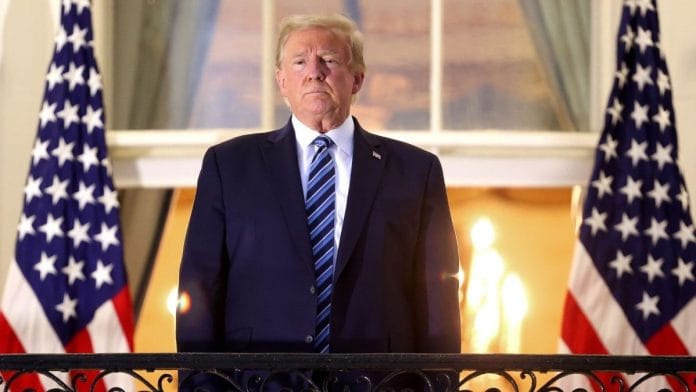Donald Trump’s Middle East diplomacy began life with implausible grandiosity. He announced his intention not only to make peace between Israel and the Palestinians, but also to resolve the century-long conflict between the Jews and the Arabs.
Foreign policy experts scoffed. Better men than Trump had tried and failed to resolve the issue for the better part of a century.
To everyone’s amazement, the Trump formula — transactional, nonjudgmental and businesslike — rendered a series of peacemaking successes. The latest is a normalization agreement between Israel and Sudan. It is not a final destination, but it is an important station on the peace train.
Trump broke the news last Friday in a televised three-way conference with Israeli Prime Minister Benjamin Netanyahu and the president of Sudan’s Sovereignty Council, General Abdel Fattah al-Burhan. Trump was typically exuberant. He announced that five more Arab countries were in line to join, mentioning Saudi Arabia specifically. He predicted that there would eventually be a family reunion of all Abraham’s descendants on the lawn of the White House.
In that unlikely event, Trump won’t be around to host the ceremony. It is very possible that he won’t even be in office after Jan. 20. But win or lose, he has changed the Middle East by re-establishing American economic and diplomatic credibility. That was the main factor in the peace agreements the U.S. brokered between Israel and two Gulf states, the United Arab Emirates and Bahrain, and they, in turn, encouraged Sudan to get on board.
Bibi was less biblical but no less euphoric. He called the deal an historical turning point. “We are cooperating with everyone, building a better future for us all,” he said.
Sudan is important to Israel because it is the third-largest Arab state. It is a former ally of the Iranian state. It gives Israel strategic depth along the coast of the Red Sea. And it has great symbolic value — consider the Arab League’s famous “three no’s declaration” made in Khartoum in 1967: No recognition of Israel, no negotiation with Israel, no peace with Israel.
Netanyahu declared general enthusiasm from “most people in the world for the new rapprochement.” Not everyone is happy, though. The Jewish Democratic Council of America, an adjunct of the Democratic Party, labeled the Sudan deal “an Israel quid pro quo driven by Trump’s short-term political interests rather than the long-term safety and security of the United States and its allies, including Israel.”
I get the partisanship, but it is hard to see what electoral benefit Trump derives from this deal. Recent polling shows Joe Biden leading Trump by a margin of around 3 to 1 among Jewish Americans. If recognizing Israeli sovereignty over the Golan Heights and moving the U.S. Embassy to Jerusalem didn’t win the hearts and votes of the Jewish community, it is hard to see how brokering a deal with Khartoum is going to do the trick.
Iran had the most astute reading of the deal. It accused Sudan of selling out the Palestinians in return for being taken off the U.S. list of terrorist nations and the promise of massive financial aid from America and the Gulf states.
This is both true and unremarkable. Sudan is one of the poorest and least developed of the Arab countries. It desperately needs cash and investments to stay afloat. Israel has already announced that it is sending a shipment of wheat to “our new friends.” Much greater aid will come from Saudi Arabia and the Gulf states.
Sudan, like most Arab states, has a terrible human-rights record, though that concerns neither Trump nor Netanyahu. The American president made his hands-off policy clear in his address to the Islamic meeting Saudi Arabia convened in May 2017. Bibi’s only concern is that opposition forces in Sudan might try to destroy normalization as they did in Lebanon in 1983.
Israel’s Gulf Arab allies see Israel as influential in Washington, as well as a useful economic partner. Joint business ventures are already underway. Other Arab countries will have other motives for making peace. But the overarching impetus comes from the recognition that the U.S. is the strong horse in the region, something that was not true during the Barack Obama administration.
Clearly Saudi Arabia, Egypt and most of the other Sunni states are rooting for a Trump re-election. Netanyahu would also like to see four more years, but he isn’t saying so publicly. In their televised phone conversation, when the president fished for an endorsement (“Bibi, do you think Sleepy Joe could have made this deal?”), Netanyahu ducked the question and said he appreciated the help of every American working for peace.
If there is change in Washington, Netanyahu will seek to convince the new president that the old certainties of the Obama years did not work and, in any case, no longer apply. His message to Biden will be that the peace train is real and moving in the right direction. Rather than dismiss it because it was started by Trump, Biden should get on board and declare himself engineer in chief. -Bloomberg
Also read: US-Israel team heads for Bahrain to officially establish Tel Aviv-Manama diplomatic ties






